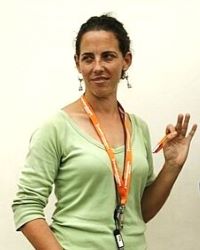Deaf in Uruguay

Photo Source:
Kate Nelson/AusAID - Wikimedia
Creative Commons
|
Send Joshua Project a map of this people group.
|
| People Name: | Deaf |
| Country: | Uruguay |
| 10/40 Window: | No |
| Population: | 7,000 |
| World Population: | 27,508,450 |
| Primary Language: | Uruguayan Sign Language |
| Primary Religion: | Unknown |
| Christian Adherents: | 1.00 % |
| Evangelicals: | 0.00 % |
| Scripture: | Portions |
| Ministry Resources: | No |
| Jesus Film: | No |
| Audio Recordings: | No |
| People Cluster: | Deaf |
| Affinity Bloc: | Deaf |
| Progress Level: |
|
Introduction / History
Every Deaf community takes on the characteristics of the country they are in. Uruguayans in general are hard to reach for Christ; the Deaf community is even harder. Just putting an interpreter in a church is not the answer, especially when the Deaf do not have any Bible background or knowledge. Some have estimated that Deaf people attending a church with interpretive sign language alone understand only two percent of the message. However, their understanding increases to 100 percent when the entire worship service including the sermon is in sign language.
What Are Their Lives Like?
Although Deaf schools initially used oralism as the preferred communication philosophy in Deaf education, bilingual methods that incorporated sign language and Spanish began to be adopted into Deaf schools in 1989. There may be some variation in sign language use throughout the country, with some sources pointing to geographical region and age being sociolinguistic variables impacting language use, it still appears that the Uruguayan Deaf community uses a single sign language: Uruguayan Sign Language.
What Are Their Beliefs?
Like the general population, the deaf in Uruguay are mostly secular. Affluence has made Uruguay one of the least evangelized countries in South America.
What Are Their Needs?
The deaf community need educational and employment opportunities. The Uruguay Deaf Association and Center for the Investigation and Development of Deaf People are training interpreters to meet ongoing educational and social access needs. The Deaf in Urugu
Prayer Points
Pray for the Deaf in Uruguay to hunger for the Lord Jesus. Ask God to provide worship services in Uruguayan Sign Language. Pray for interpreters who love and relate to the deaf.